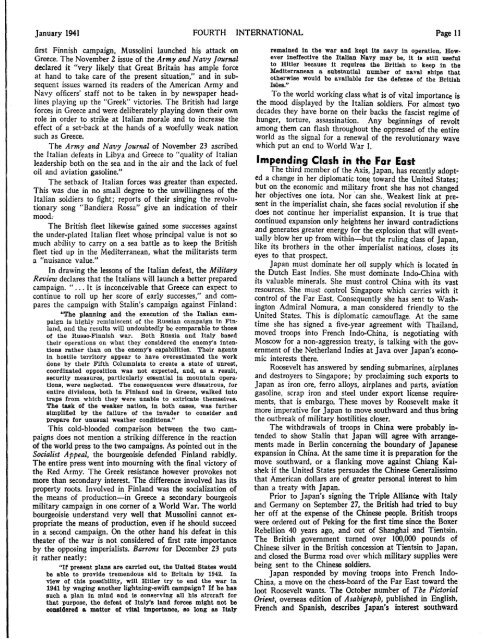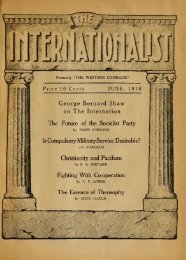January 1941 - Marxists Internet Archive
January 1941 - Marxists Internet Archive
January 1941 - Marxists Internet Archive
You also want an ePaper? Increase the reach of your titles
YUMPU automatically turns print PDFs into web optimized ePapers that Google loves.
<strong>January</strong> <strong>1941</strong> FOURTH INTERNATIONAL Page 11<br />
first Finnish campaign, Mussolini launched his attack on<br />
Greece. The November 2 issue of the Army and Navy Journal<br />
declared it livery likely that Great Britain has ample force<br />
at hand to take care of the present situation," and in subsequent<br />
issues warned its readers of the American Army and<br />
Navy officers' staff not to be taken in by newspaper headlines<br />
playing up the "Greek" victories. The British had large<br />
forces in Greece and were deliberately playing down their own<br />
role in order to strike at I talian morale and to increase the<br />
effect of a set-back at the hands of a woefully weak nation<br />
such as Greece.<br />
The Army and Navy Journal of November 23 ascribed<br />
the I talian defeats in Libya and Greece to "quality of Italian<br />
leadership both on the sea and in the air and the lack of fuel<br />
oil and aviation gasoline."<br />
The setback of I tali an forces was greater than expected.<br />
This was due in no small degree to the unwillingness of the<br />
Italian soldiers to fight; reports of their sin'ging the revol u<br />
tionary song "Bandiera Rossa" give an indication of their<br />
mood:<br />
The British fleet likewise gained some successes against<br />
the under-plated I talian fleet whose principal value is not so<br />
much ability to carryon a sea battle as to keep the British<br />
fleet tied up in the Mediterranean, what the militarists term<br />
a "nuisance value."<br />
In drawing the lessons of the Italian defeat, the Military<br />
Review declares that the Italians will launch a better prepared<br />
campaign. If ••• I t is inconceivable that Greece can expect to<br />
continue to roll up her score of early successes," and compares<br />
the campaign with Stalin's campaign against Finland:<br />
"The planning and the execution of the Italian campaign<br />
is highly reminiscent of the Russian campaign in Finland,<br />
and the results will undoubtedly be comparable to' those<br />
of the RUBBo-Finnish war. Both Russia and Italy based<br />
their operations on what they considered the enemy's intentions<br />
rather than on the enemy's capabilities. Their agents<br />
in hostile territory appear to have overestimated the work<br />
done by their Fifth Columnists to create a state of unrest,<br />
coordinated oppOSition was not expected, and, as a result,<br />
security measures, particularly essential in mountain operations,<br />
were neglected. The consequences were disastrous, for<br />
entire divisions, both in Finland and in Greece, walked into<br />
traps from which they were unable to extricate themselves.<br />
The task of the weaker nation, in both cases, was further<br />
Simplified by the failure of the invader to consider and<br />
prepare for unusual weather conditions."<br />
This cold-blooded comparison between the two campaigns<br />
does not mention a striking difference in the reaction<br />
of the world press to the two campaigns. As pointed out in the<br />
Socialist A ppeal, the bourgeoisie defended Finland rabidly.<br />
The entire press went into mourning with the final victory of<br />
the Red Army. The Greek resistance however provokes not<br />
more than secondary interest. The difference involved .has its<br />
property roots. Involved in Finland was the socialization of<br />
the means of production-in Greece a secondary bourgeois<br />
military campaign in one corner of a World War. The world<br />
bourgeoisie understand very well that Mussolini cannot expropriate<br />
the means of production, even if he should succeed<br />
in a second campaign. On the other hand his defeat in this<br />
theater of the war is not considered of first rate importance<br />
by the opposing imperialists. Barrons for December 23 puts<br />
it rather neatly:<br />
"It present plans are carried out, the United States would<br />
be able to provide tremendous aid to Britain by 1942. In<br />
view· of this possibility, wlll Hitler try to end the war in<br />
<strong>1941</strong> by waging another lightning-swift campaign? If he has<br />
such a plan in mind and is conserving all his aircraft for<br />
that purpose, the defeat of Italy's land ·forces might not be<br />
considered a matter of vital importance, so long as Italy<br />
remained in the war and kept its navy in operation_. However<br />
ineffective the Italian Navy may be, it is still useful<br />
to Hitler because it requires the British to keep in the<br />
Mediterranean a substantial number of naval ships that<br />
otherwise would be available for the defense of the British<br />
Isles."<br />
To the world working class what is of vital importance is<br />
the mood displayed by the I talian soldiers. For almost two<br />
decades they have borne on their backs the fascist regime ·of<br />
hunger, torture, assassination. Any beginnings of revolt<br />
among them can flash throughout the oppressed of the entire<br />
world as the signal for a renewal of the revolutionary wave<br />
which put an end to World \Var I.<br />
Impending Clash in the Far East<br />
The third member of the Axis, Japan, has recently adopted<br />
a change in her diplomatic ton~ toward the United States;<br />
but on. the, economi~ and mil~tary front she has not changed<br />
her objectIves one IOta. Nor can she., Weakest link at present<br />
in the imperialist chain, she faces social revolution if she<br />
does not continue her imperialist expansion. It is true that<br />
continued expansion only heightens her inward contradictions<br />
and generates greater energy for the explosion that will event<br />
~ally. blow her up from within-but the ruling class of Japan,<br />
hke Its brothers in the other imperialist nations, closes its<br />
eyes to that prospect.<br />
Japan must dominate her oil supply which is located in<br />
the Dutch East Indies. She must dominate Indo-China with<br />
its valuable minerals. She must control China with its vast<br />
resources. She must control Singapore which carries with it<br />
control of the Far East. Consequently she has sent to Wash~<br />
ington Admiral Nomura, a man considered friendly to the<br />
United States. This is diplomatic camouflage. At the same<br />
time she has signed a five-year agreement with Thailand,<br />
moved troops into French Indo-China, is negotiating with<br />
Moscow for a non-aggression treaty, is talking with the government<br />
of the Netherland Indies at Java over Japan's economic<br />
interests there.<br />
Roosevelt has answered by sending submarines, airplanes<br />
and destroyers to Singapore; by proclaiming such exports to<br />
Japan as iron ore, ferro alloys, airplanes and parts, aviation<br />
gasoline, scrap iron and steel under export license requirements,<br />
that is embargo. These moves by Roosevelt make it<br />
more imperative for Japan to move southward and thus bring<br />
the outbreak of military hostilities closer.<br />
The withdrawals of troops in China were probably' intended<br />
to show Stalin that Japan will agree with arrangements<br />
made in Berlin concerning the boundary of Japanese<br />
expansion in China. At the same time it is preparation for the<br />
move southward, or a flanking move against Chiang Kaishek<br />
if the United States persuades the Chinese Generalissimo<br />
that American dollars are of greater personal interest to him<br />
than a treaty with Japan.<br />
Prior to Japan's signing the Triple Alliance with Italy<br />
and Germany on September 27, the British had tried to buy<br />
her off at the expense of the . Chinese people. British troops<br />
were ordered out of Peking for the first time since the Boxer<br />
Rebellion 40 years ago, and out of Shanghai and Tientsin.<br />
The British government turned over 100,000 pourtds of<br />
Chinese silver in the British ~oncession at Tientsin to Japan,<br />
and closed the Burma road over which military supplies were<br />
being sent to the Chinese soldiers.<br />
Japan responded by moving troops into French Indo<br />
China, a move on the chess-board of the Far East toward the<br />
loot Roosevelt wants. The October number of The Pictorial<br />
Orient, overseas edition of Asahigraph, published in English,<br />
French and Spanish, describes Japan's interest southward
















